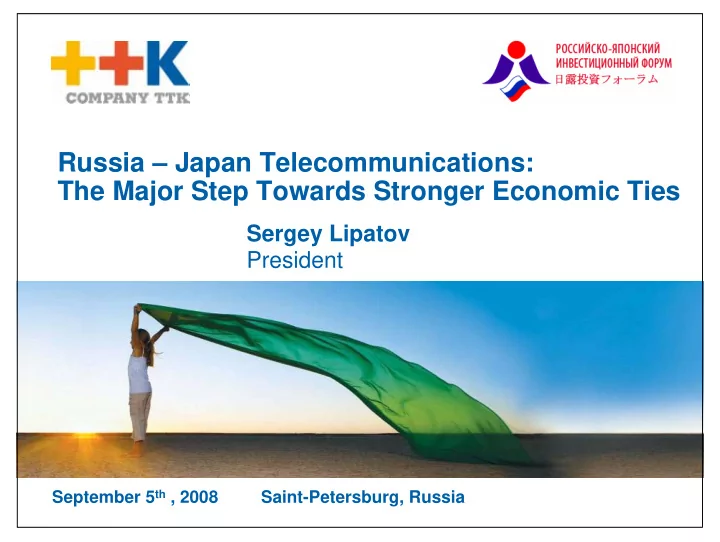

Russia – Japan Telecommunications: The Major Step Towards Stronger Economic Ties Sergey Lipatov President September 5 th , 2008 Saint-Petersburg, Russia
Towards global connecting • Communications always play an important role in ties between peoples, businesses and countries. Today their role is increasing due to national markets liberalization and globalization process in world economy. • Telecommunications is one of the most growing industries. According to Telecommunication Industry Association its revenue will reach US $3 trillion by 2010. • Russian telecom sector shows a robust growth among telecom markets in the world. During last few years it has been growing at about 30% annually and has reached over 1 trillion rubles in 2007 as reported by the Ministry of Communications of RF Today people and businesses prefer to communicate more and more virtually and online via Internet, which consumes 75% of globally installed telecom capacity 2
Global information exchange Global community constantly requires to increase available telecom capacity of international networks: • For the past 6 years installed global telecom capacity increased more than 10 times and reached 11 million megabits per second. It will grow 5 times by 2014 (PriMetrica, 2008). • Growth rate between Europe and Asia will be even higher – 8 times. For many years global information exchange was carried out through the territory of the USA and submarine cables due to the absence of direct telecom infrastructure between Europe and Asia 3
New approach to global communications • During last years a lot of backbone telecom infrastructure has been built in Eurasia, particularly in Russia; • Global telecom architecture is changing. Main focus is shifting to network coverage expansion through complementing submarine networks with terrestrial networks. • Russian territory is a logical bridge between Japan and Europe 4
EurasiaHighway - Geographical advantages : • Terrestrial route and broad access to Russia; • The shortest route between Europe and Japan; • Multi-entrance access to emerging CIS markets. - Technical advantages: • Minimal signal delay at the route Europe – Asia < 200 ms; • Fully redundant ring topology network; • Significant potential for network capacity increase– up to 400 Gbps; • Cable damage restoration < 4 hours; 5
TTK – NTT Com initiative NTT Com - TTK Partnership In March 2007, Company TTK and NTT Communications signed an agreement on the construction of high-capacity submarine cable linking Hokkaido and Sakhalin islands. In August 2007, TTK has completed the construction of submarine cable from Russia mainland to Sakhalin island. Since the beginning of the project both sides agreed to work with diligence and to build new Hokkaido - Sakhalin Cable System (HSCS) in unprecedentedly short time – 9 months. 6
Hokkaido – Sakhalin Cable System Submarine cable installation between Sakhalin and Hokkaido started in July 2007. HSCS basic parameters: • Landing stations - Nevelsk (Russia) and Ishikari (Japan) • Length – 583 km • Technology - DWDM • Design capacity – 640 Gbps • Initial installed capacity – 40 Gbps 7
Building on success Opening ceremony in Tokyo HSCS phases & schedule: • Memorandum of Understanding signing – February 2007 • Construction contract signing – March 2007 • Submarine cable deployment – December 2007 • HSCS opening ceremony – April 2008 • Start of commercial operation – July 2008 Comprehensive and prompt support from the governmental institutions of Russia and Japan was extremely important for the success of the project 8
HSCS global and regional impact (1) New cable system between Russia and Japan will contribute to various types of businesses and human activities globally and regionally: Corporations: via access to 1,000 TTK’s points of presence in Russia Japanese companies can develop online business model through virtual networks and dedicated channels. Finance: Today signal delay became critical for online transactions of financial institutions that operate globally and around-the-clock. HSCS provides the best parameters and the lowest signal delay of 200 ms between Europe and Asia Oil & Gas Industry: Modern gas & oil platform requires capacity from 155 to 1,000 Mbps for real-time monitoring, seismic telemetric information, video-conferencing, social online communication. TTK has extensive fiber-optic network, which is being used for international projects in Sakhalin island 9
HSCS global and regional impact (2) Transport & Logistics: Direct link between Russia and Japan will improve communications for transport industry in the Far East. It will stimulate use of electronic documents across the whole logistic chain of intermodal transportation. Social Projects: TTK has positive experience in providing telecom capacity for scientific networks (DANTE, TEIN2) and Summer Olympics 2008. HSCS makes possible direct projects between Russian and Japanese organizations, i.e. telemedicine or education. Lifestyle: IP TV, High-Definition TV, online exchange of video- and audio files become an ordinary lifestyle among the people. HSCS has enough capacity for current and future demand to help people to communicate easily in any remote places in Russia and Japan. 10
Thank you for attention! 7 Dolgorukovskaya Str., Moscow, Russia, 127006 T: +7 (495) 784 6670 F: +7 (495) 784 6671 E: info@transtk.ru www.ttk.ru
Recommend
More recommend